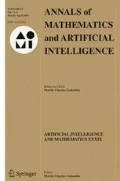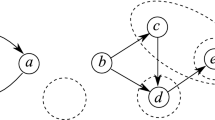Abstract
While the axiomatic system P is an important standard for plausible, nonmonotonic inferences from conditional knowledge bases, it is known to be too weak to solve benchmark problems like Irrelevance or Subclass Inheritance. Ordinal conditional functions provide a semantic base for system P and have often been used to design stronger inference relations, like Pearl’s system Z, or c-representations. While each c-representation shows excellent inference properties and handles particularly Irrelevance and Subclass Inheritance properly, it is still an open problem which c-representation is the best. In this paper, we consider the skeptical inference relation, called c-inference, that is obtained by taking all c-representations of a given knowledge base into account. We study properties of c-inference and show in particular that it preserves the properties of solving Irrelevance and Subclass Inheritance. Based on a characterization of c-representations as solutions of a Constraint Satisfaction Problem (CSP), we also model skeptical c-inference as a CSP and prove soundness and completeness of the modelling, ensuring that constraint solvers can be used for implementing c-inference.
Similar content being viewed by others
References
Adams, E.W.: The Logic of Conditionals. D. Reidel, Dordrecht (1975)
Benferhat, S., Cayrol, C., Dubois, D., Lang, J., Prade, H.: Inconsistency management and prioritized syntax-based entailment. In: Proceedings of the Thirteenth International Joint Conference on Artificial Intelligence (IJCAI’93), vol. 1, pp. 640–647. Morgan Kaufmann Publishers, San Francisco (1993)
Benferhat, S., Dubois, D., Prade, H.: Possibilistic and standard probabilistic semantics of conditional knowledge bases. J. Log. Comput. 9(6), 873–895 (1999)
Beierle, C., Eichhorn, C., Kutsch, S.: A practical comparison of qualitative inferences with preferred ranking models. KI 31(1), 41–52 (2017)
Beierle, C., Eichhorn, C., Kern-Isberner, G.: Skeptical inference based on c-representations and its characterization as a constraint satisfaction problem. In: Gyssens, M., Simari, G.R. (eds.) Proceedings of 9th International Symposium Foundations of Information and Knowledge Systems, FoIKS 2016 Linz, Austria, March 7–11. vol. 9616 of LNCS, pp. 65–82. Springer, New York (2016)
Beierle, C., Eichhorn, C., Kern-Isberner, G., Kutsch, S.: Skeptical, weakly skeptical, and credulous inference based on preferred ranking functions. In: Kaminka, G.A., Fox, M., Bouquet, P., Hüllermeier, E., Dignum, V., Dignum, F., van Harmelen, F. (eds.) Proceedings 22nd European Conference on Artificial Intelligence, ECAI-2016, vol. 285, pp. 1149–1157. IOS Press (2016)
Beierle C., Kutsch, S.: Regular and sufficient bounds of finite domain constraints for skeptical c-inference. In: Benferhat, S., Tabia, K., Ali, M. (eds.) Advances in Artificial Intelligence: From Theory to Practice, vol. 10350 of LNCS, pp. 477–487. Springer, New York (2017)
Beierle C., Kutsch, S.: Comparison of inference relations defined over different sets of ranking functions. In: Antonucci, A., Cholvy, L., Papini, O. (eds.) Proceedings of 14th European Conference Symbolic and Quantitative Approaches to Reasoning with Uncertainty, ECSQARU 2017, Lugano, Switzerland, July 10–14, 2017, vol. 10369 of Lecture Notes in Computer Science, pp. 225–235 (2017)
Beierle, C., Kern-Isberner, G.: Semantical investigations into nonmonotonic and probabilistic logics. Ann. Math. Artif. Intell. 65(2-3), 123–158 (2012)
Beierle, C., Kern-Isberner, G., Sȯdler, K.: A declarative approach for computing ordinal conditional functions using constraint logic programming. In: 19th International Conference on Applications of Declarative Programming and Knowledge Management, INAP 2011, and 25th Workshop on Logic Programming, WLP 2011, Wien, Austria, Revised Selected Papers, vol. 7773 of LNAI, pp. 175–192. Springer, New York (2013)
Bezzazi, H., Makinson, D., Pereź, P.R.: Beyond rational monotony: some strong non-horn rules for nonmonotonic inference relations. J. Log. Comput. 7(5), 605–631 (1997)
Bochman, A.: A logical theory of nonmonotonic inference and belief change. Springer, New york (2001)
Bezzazi H., Pereź, R.P.: Rational transitivity and its models. In: Proceedings of the 26th international symposium on multiple-valued logic (ISMVL ’96), pp. 160–165. IEEE Computer Society, Washington (1996)
de Finetti, B.: La prévision, ses lois logiques et ses sources subjectives. Ann. Inst. H. Poincaré 7(1), 1–68 (1937). English translation in Studies in Subjective Probability, ed. H. Kyburg and H.E. Smokler, 1974, pp. 93–158. New York: Wiley & Sons.
Dubois, D., Prade, H.: Conditional objects as nonmonotonic consequence relations: main results. In: Principles of knowledge representation and reasoning: Proceedings of the fourth international conference (KR’94), pp. 170–177. Morgan Kaufmann Publishers, San Francisco (1994)
Dubois, D., Prade, H.: Conditional objects as nonmonotonic consequence relations. In: Principles of knowledge representation and reasoning: Proceedings of the fourth international conference (KR’94), pp. 170–177. Morgan Kaufmann Publishers, San Francisco (1996)
Dubois D., Prade, H.: Possibility theory and its applications: Where do we stand? In: Kacprzyk J., Pedrycz, W. (eds.) Springer Handbook of Computational Intelligence, pp. 31–60. Springer, Berlin (2015)
Goldszmidt, M., Pearl, J.: On the consistency of defeasible databases. Artif. Intell. 52(2), 121–149 (1991)
Goldszmidt, M., Pearl, J.: On the relation between rational closure and System-Z. UCLA computer science department (1991)
Goldszmidt, M., Pearl, J.: Qualitative probabilities for default reasoning, belief revision, and causal modeling. Artif. Intell. 84(1-2), 57–112 (1996)
Halpern, J. Y.: Reasoning about uncertainty. MIT press (2005)
Kern-Isberner, G.: Conditionals in nonmonotonic reasoning and belief revision – considering conditionals as agents. Number 2087 in Lecture Notes in Computer Science. Springer Science+Business Media, Berlin (2001)
Kern-Isberner, G.: A thorough axiomatization of a principle of conditional preservation in belief revision. Ann. Math. Artif. Intell. 40, 127–164 (2004)
Kern-Isberner, G., Eichhorn, C.: Structural inference from conditional knowledge bases. In: Unterhuber, M., Schurz, G. (eds.) Logic and probability: reasoning in uncertain environments, number 102 (4) in Studia Logica, pp. 751–769. Springer Science+Business Media, Dordrecht (2014)
Kraus, S., Lehmann, D.J., Magidor, M.: Nonmonotonic reasoning, preferential models and cumulative logics. Artif. Intell. 44(1–2), 167–207 (1990)
Lewis, D.: Counterfactuals. Harvard University Press, Cambridge (1973). Mass
Lehmann, D.J., Magidor, M.: What does a conditional knowledge base entail? Artif. Intell. 55(1), 1–60 (1992)
Makinson, D.: General patterns in nonmonotonic reasoning. In: Gabbay, D.M., Hogger, C.J., Robinson, J.A. (eds.) Handbook of Logic in Artificial Intelligence and Logic Programming, vol. 3, pp. 35–110. Oxford University Press, New York (1994)
Carlsson, M., Ottosson, G., Carlson, B.: An open-ended finite domain constraint solver. In: Glaser, H., Hartel, P.H., Kuchen, H. (eds.) Programming Languages: Implementations, Logics, and Programs, (PLILP’97), vol. 1292 of LNCS, pp. 191–206. Springer, New York (1997)
Pearl, J.: Probabilistic reasoning in intelligent systems. Morgan Kaufmann Publishers Inc, San Francisco (1988)
Pearl, J.: Probabilistic semantics for nonmonotonic reasoning: A survey. In: Shafer, G., Pearl, J. (eds.) Readings in uncertain reasoning, pp. 699–710. Morgan Kaufmann, San Mateo (1989)
Pearl, J.: System Z: A natural ordering of defaults with tractable applications to nonmonotonic reasoning. In: Parikh, R. (ed.) Proceedings of the 3rd Conference on Theoretical Aspects of Reasoning About Knowledge (TARK1990), pp. 121–135. Morgan Kaufmann Publishers Inc, San Francisco (1990)
Snow, P.: The emergence of ordered belief from initial ignorance. In: Proceedings AAAI-94, pp. 281-286, Seattle, WA (1994)
Spohn, W.: Ordinal conditional functions: a dynamic theory of epistemic states. In: Harper, W.L., Skyrms, B. (eds.) Causation in Decision, Belief Change, and Statistics, II, pp. 105–134. Kluwer Academic Publishers, Dordrecht (1988)
Spohn, W.: The laws of belief: Ranking theory and its philosophical applications. Oxford University Press, Oxford (2012)
Thorn, P.D., Eichhorn, C., Kern-Isberner, G., Schurz, G.: Qualitative probabilistic inference with default inheritance for exceptional subclasses. In: Beierle, C., Kern-Isberner, G., Ragni, M., Stolzenburg, F. (eds.) Proceedings of the 5th Workshop on Dynamics of Knowledge and Belief (DKB-2015) and the 4th Workshop KI & Kognition (KIK-2015) co-located with 38th German Conference on Artificial Intelligence (KI-2015), vol. 1444 of CEUR Workshop Proceedings (2015)
Acknowledgments
This work was supported by DFG-Grant KI1413/5-1 of Prof. Dr. Gabriele Kern-Isberner as part of the priority program “New Frameworks of Rationality” (SPP1516). Christian Eichhorn is supported by this Grant. This work benefitted very much from discussions led during Dagstuhl Seminar 15221 “Multi-disciplinary approaches to reasoning with imperfect information and knowledge - a synthesis and a roadmap of challenges”.
We thank all our students who have been involved in the implementation of the software system InfOCF, in particular Karl Södler, Martin Austen, Matthias Wirths, and Fadil Kallat. We are also very grateful to the anonymous referees of this article for their detailed and helpful comments.
Author information
Authors and Affiliations
Corresponding author
Rights and permissions
About this article
Cite this article
Beierle, C., Eichhorn, C., Kern-Isberner, G. et al. Properties of skeptical c-inference for conditional knowledge bases and its realization as a constraint satisfaction problem. Ann Math Artif Intell 83, 247–275 (2018). https://doi.org/10.1007/s10472-017-9571-9
Published:
Issue Date:
DOI: https://doi.org/10.1007/s10472-017-9571-9
Keywords
- Conditional
- Conditional knowledge base
- System P
- System Z
- C-representation
- C-inference
- Constraint satisfaction problem



